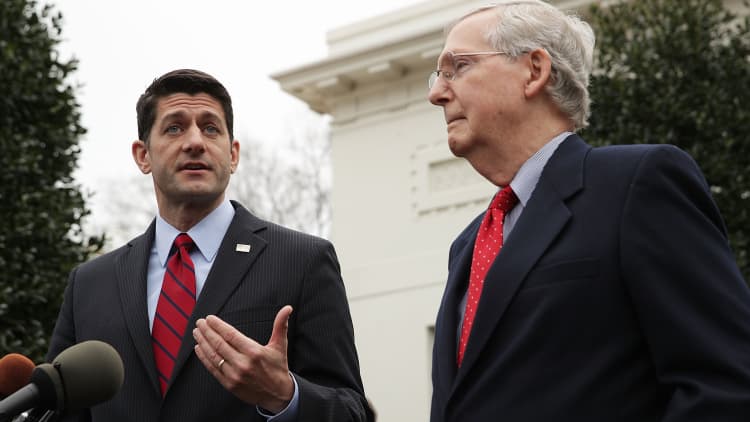
The Republican tax plan unveiled Wednesday seeks to spark economic growth through lower rates but could punish one key market area: U.S. government bonds.
A key provision of the reform plan calls for the repatriation of cash that multinational companies are holding overseas. While details remain thin, foreign holdings will get softer tax treatment when they are brought home. Companies have about $2.5 trillion stashed abroad.
Treasurys fit into the equation because much of that overseas money is held in cash, cash equivalents or short-term investments — a category that includes government debt.
So, when companies start pulling that money back to the U.S., that presumably would mean selling of Treasurys, a move that would push up yields. Buyers will be needed for those bonds as government debt and deficits increase, which also could see a demand for higher rates.
"A lot of attention is bound to focus on the implications for U.S. equities of the Republicans' updated tax reform 'framework,'" John Higgins, chief markets economist at Capital Economics, said in a note.
"Nonetheless, the implications for U.S. government bonds could also be significant if the framework includes President Trump's previous plans to impose a repatriation tax on the retained foreign earnings of US multinational enterprises and end the deferral of taxes on corporate income earned abroad."
The tax plan does just that, though the exact taxation levels are still uncertain.
According to an outline the GOP issued, the new structure "ends the perverse incentive to keep foreign profits offshore by exempting them when they are repatriated to the United States." The new plan will include "rules to protect the U.S. tax base by taxing at a reduced rate and on a global basis the foreign profits of U.S. multinational corporations."
Higgins used Microsoft as an example of what will happen. The software giant is holding about $133 billion in cash, equivalents and short-term investments, almost all of which is held by foreign subsidiaries. The company is a leader among Russell 1000 firms in terms of offshore cash. Should the company participate in the repatriation program, that will create a new supply of debt that could drive up rates.
Repatriation is an effort to get the U.S. on a level playing ground internationally, as its 35 percent corporate rate is the highest in the developed world. Companies store cash abroad in order to protect their profits from higher taxes.
Higgins pointed out that Ireland and its 12.5 percent corporate tax rate has made it both a popular destination for offshore cash and the biggest net buyer of Treasurys over the past six years. Ireland holds $310.8 billion of U.S. debt, placing it third in the world, according to Treasury data.
Some of the pressure on yields from corporate selling would be mitigated by the return of that money to the U.S. banking system. However, investors are still likely to demand higher yields in exchange for buying government debt, said Vertical Group banking analyst Dick Bove.
A common criticism of the details released Wednesday is that they don't include any offsetting revenue or state the impact the plan will have on the government budget deficit or debt level, currently at $20.2 trillion. Bove figures the $587 billion deficit will increase considerably under the GOP proposal.
"In order to get the tax rates reduced, interest rates have to go up because the potential buyers of the debt are going to demand more in order to take on that debt," Bove said in a phone interview. "Or, they're going to say they don't want it, which is really going to drive rates higher."
What's more, the Federal Reserve is already on a rate-hiking course, with the market expecting another quarter-point increase in December. Should the central bank continue on its professed path of regular increases, as well as the unwinding of its $4.5 trillion balance sheet that includes nearly $2.5 trillion of Treasurys, that would compound the yield pressure.
The Fed has a mechanism in place under which it can effectively force banks to buy "high-quality liquid assets." Bove thinks the Fed likely will increase the ratio of those assets banks are required to hold in the event that rates start to rise unpredictably while the central bank is no longer buying bonds.
However, Capital's Higgins says the market is underestimating how aggressively yields will rise. He forecasts the benchmark 10-year Treasury yield will reach 3 percent in 2018 from its current level of 2.3 percent. The yield has risen nearly a quarter point since Sept. 8.
WATCH: Larry Kudlow gives his take on what he sees as a major part of tax reform.



